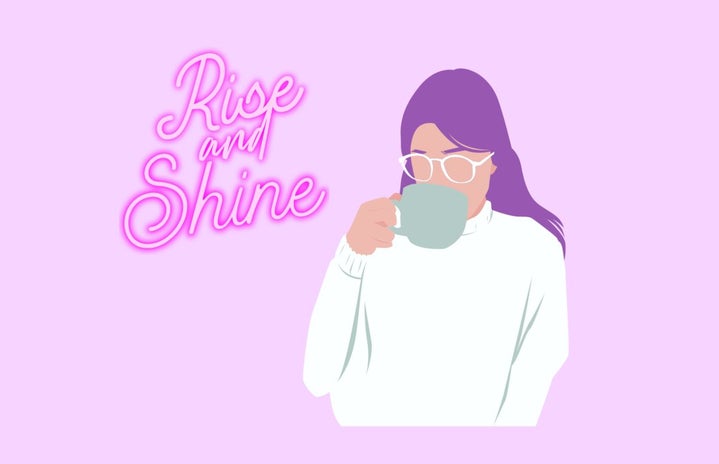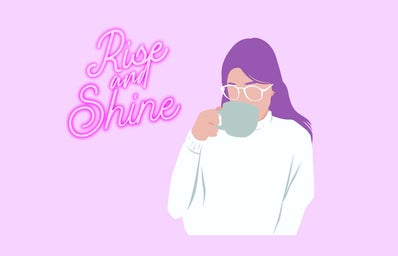Many would say there is no specific way in which one can do this. Whilst a figure of speech indeed, quite literally take a leaf out of ‘Sam Leaper’s Little Book Of Wisdom’.
Not every day will be good because how can we distinguish good without bad? However, waking up with the desire to make sure you go to bed knowing you’ve lived that day as closely to how you would live your last is the most fruitful way to begin.
The three ideas to take home:
Idea One
Sam defined success as striking a balance within the following:
A. Working and playing, whilst you may want to live your last day bungee jumping or spending every penny you have left – if people are relying on you, make sure that box is ticked first e.g. finishing a group project or performing in a play you’re in – in other words not letting the side down! Play after. Still play though.
B. Humility and confidence, if you fall over – fall over well, with confidence, make that fall the best fall it could be. No person can take that effort away, no one.
C. Kindness and formidability – be nice, it’s your last day – leave a footprint of sunshine in someone else’s perception, but coupled with that, be formidable, not a pushover. It is non-sensical to waste even a second on over-accommodating.
Idea Two
Setting goals for the day with a plan on how to achieve them is always something I find works. Once you’ve got up and achieved the first thing on the list, the next thing feels easier. Productivity provokes happiness so much more than anyone would ever realise. I came across a very cliché quote in some teen’s Instagram bio saying ‘Be lucky enough to live – some people just exist’. It very much hit home. To break it down:
Premise 1 - If one is living, one is doing things
Premise 2 – We live to do things
Conclusion – Therefore one is living
So, if we are productive, we are doing what we were set out to do as humans. That in turn makes life so much simpler. We hold the knowledge that when everything is stripped back, the life box is ticked for today.
If you have your goals set out each day, a feeling of momentum can come into play, to the point where no one can stop you.
Idea Three
If things do go wrong, avoid letting the wrong roll into the next day.
Sam deconstructed regret into three parts. He describes the first part as the “memory of the original event or the circumstances, that creates the pain, which you now continue to experience”.
The second part is the pain section, Sam describes this as a “blinking red light (that feels like an elephant sitting on your chest)” telling you how imperative it is that you address it.
The final partition of the deconstruction is the lesson. Alternatively, as Sam presents it, “the very thing that a lot of people know nothing about, rarely notice and in turn have to deal, forever, with an elephant sitting on their chest”.
Sam distinguished between two types of bins we are provided with here on Earth. One bin is the ‘CAN CONTROL’ and the other is the ‘CAN’T CONTROL’. He linked his bin theory to the philosopher Marcus Aurelius who once said “You have power over your mind – not outside events. Realise this, and you will find strength”. That is the FIRST class (NOT business and NOT economy) route to waking up on the right side of the bed. If you go through the day keeping the contents of your ‘CAN CONTROL’ bin in focus, all irrelevant obstacles fade away, you are then free and so is a lot of your time.
Sam wrote of a few things he would hope would be true once his time was up:
-
The world better because I was here (or at the very least, not worse)
-
Had a really good time
-
Placed doing good over looking good
-
Was able to not sweat the small stuff
-
As much as possible, did what was right instead of what was easy
If we take that leaf out of Sam’s book and want to achieve the things on that rather impressive list, all three ideas are directional in ensuring completion.
Idea One, A balance of A, B and C all encourage success.
Idea Two, Productivity is key.
Idea Three, With all pain there is a lesson, rather than dwelling – you have your CAN and CAN’T CONTROL bins – make sure they get used.
Sam (Oli, but he wrote under a pseudonym on Quora) was the brother of my friend Max. The list of lessons in his ‘Little Book Of Wisdom’ is applicable to all situations. It really is that simple – the way you can value your day is knowing that if it was your last it would be rather non-sensical to waste it. Any day where I feel ungrateful or angry, I am continually trying to swap the thought into appreciation for another day I am able to live. Oli died on September 10th this year from ‘sudden adult death syndrome’. He was 25 years old with many more years of zesty life ahead of him. Whilst his death is such a tragic loss, I have learnt something so priceless. ‘Carpe Diem’ – seize the day, because what if you don’t get another one? The phrase ‘life is short’ creeps into people’s vocabulary too often but is not put into practice enough. Follow the three ideas and wake up on the right side because why else wouldn’t you?
Oli’s family are fundraising to build 100 schools in his honour. To order ‘Sam Leaper’s Little Book Of Wisdom’ and find out more about how you can help click here.
Images in this article taken from https://oliverwissenbach.com.



